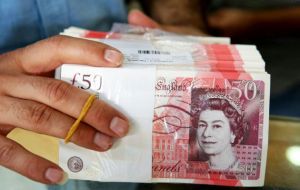MercoPress. South Atlantic News Agency
UK inflation steady in March with rising food and clothing prices
 Although the inflation rate remained unchanged from February, it remains above the Bank of England's target of 2% and is the highest since September 2013.
Although the inflation rate remained unchanged from February, it remains above the Bank of England's target of 2% and is the highest since September 2013.  ”Food, drink and clothing prices rose in March. However, this is offset by air fares, which fell slightly but last year rose substantially thanks to the timing of Easter
”Food, drink and clothing prices rose in March. However, this is offset by air fares, which fell slightly but last year rose substantially thanks to the timing of Easter Inflation in the United Kingdom held steady last month, as rising prices for food and clothing were offset by lower air fares. The UK Office for National Statistics, ONS, said inflation as measured by the Consumer Prices Index remained at 2.3%.
The main downward effect on inflation last month came from air fares, which was due to the timing of Easter. However, the ONS data showed food prices in March were 1.2% higher than last year, the biggest annual rise in three years. Inflation has been accelerating in recent months, partly as a result of the fall in the pound after the Brexit vote, which has raised import prices.
Although the inflation rate remained unchanged from February, it remains above the Bank of England's target of 2% and is the highest since September 2013.
“Inflation may be steady, but it's still currently outpacing wages and interest rates, which spells trouble for households and cash savers,” said Laith Khalaf, senior analyst at Hargreaves Lansdown.
“The inflationary squeeze that's coming is going to mean consumers have to spend more at the check-outs and petrol pumps, and that reduces their capacity to fund discretionary spending.”
Earlier on Tuesday, a survey by the British Retail Consortium and KPMG suggested consumers were reining back spending in the face of rising food prices. Total spending on non-food items fell by 0.8% in the January-to-March period, the survey found, which was the weakest three-month performance for nearly six years.
ONS figures showed that the cost of air fares fell by nearly 4% in March from the month before. However, last year, when Easter Sunday fell on 27 March, air fares had jumped by more than 20% amid higher demand.
With Easter Sunday falling on 16 April this year, economists are expecting inflation to pick up this month. As well as air fares, fuel also had a downward impact on inflation in March, as the prices paid by motorists at the pump fell slightly. The biggest upward impact on inflation came from food and non-alcoholic drinks, where prices rose by 0.4% in March from the month before, compared with a 0.6% fall a year earlier.
The ONS's new preferred inflation measure of CPIH, which contains a measure of housing costs, also remained unchanged at 2.3% in March. The Retail Prices Index (RPI) measure of inflation fell to 3.1% last month, from 3.2% in February.
ONS deputy national statistician Jonathan Athow said: “Food, drink and clothing prices all rose in March. However, this is offset by air fares, which fell slightly but last year rose substantially thanks to the timing of Easter.
”The costs of raw materials and the price of manufactured goods leaving factories were both little changed, as falling fuel prices helped stem further rises.“ Data from the ONS showed the annual rate of producer price inflation fell back slightly in March.
The prices paid by companies for materials and energy rose at an annual pace of 17.9%, down from February's rate of 19.4%.
”Today's producer prices release suggests that the impact of the weaker pound on manufacturers' input costs may have peaked,“ said Martin Beck, senior economic adviser to the EY Item Club.
”However, there is still some way to go until these pressures have fully passed along the supply chain to consumers, so the headline measures of inflation are likely to climb further over the coming months. It is looking increasingly likely that the CPI measure will breach the 3% barrier during the summer”.




Top Comments
Disclaimer & comment rules-

-

Read all comments...but on the plus side...
Apr 12th, 2017 - 05:23 pm 0there isn't one...
_ _
@@
(——)
I noticed the shrinking of food products in an attempt to stave off inflation but the reality is we are going to see rising prices. We will all be poorer as a result of Brexit. On the other hand there are more pressing world problems with the trigger-happy madman in the White House. Now he has seen that blowing things up has increase his appalling approval rating he has a taste for it. If he takes on NK he is taking on China and I don't think any of us want to see that war.
Apr 14th, 2017 - 03:46 pm 0What idiots voted to make us weaker and alone in an unsettled world. I guess the same morons that wanted to see Trump in the White House.
Commenting for this story is now closed.
If you have a Facebook account, become a fan and comment on our Facebook Page!